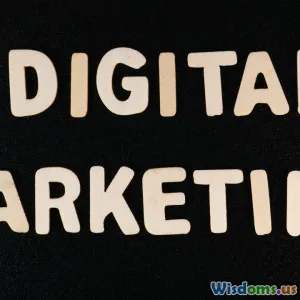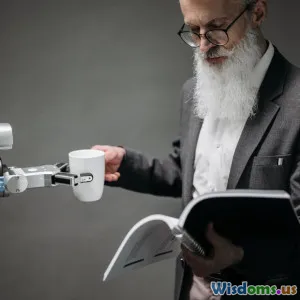
Navigating Careers in the AI Era
7 min read Explore how to successfully navigate and future-proof your career in the age of AI innovation and disruption. (0 Reviews)
Navigating Careers in the AI Era
Introduction: Entering the AI Epoch
Imagine stepping into a world where intelligent machines don't just coexist with humans, but actively influence how careers evolve. This is not science fiction but our unfolding reality. Artificial intelligence (AI) is transforming jobs, industries, and skill requirements at a pace never before seen. Amid these rapid changes, professionals face critical questions: How do you future-proof your career? Can human ingenuity coexist and flourish alongside AI? This article unpacks these questions and offers actionable insights to navigate the evolving labor landscape shaped by AI.
The AI Impact on Jobs: Disruption and Creation
The narrative around AI and work is often framed in terms of displacement. Indeed, a 2020 McKinsey report suggests that up to 30% of tasks in 60% of occupations may be automated. Roles centered on routine, repetitive tasks face significant risk. For example, manufacturing assembly lines have seen robots streamline production, reducing the need for manual labor.
However, this is just one side of the coin. AI also acts as a powerful force for job creation. According to the World Economic Forum’s Future of Jobs Report 2023, around 97 million new roles may emerge, especially in fields intertwining technology and human expertise.
To grasp this duality, consider the healthcare sector where AI algorithms assist in diagnostics while clinicians focus on empathetic patient care—a balance unattainable without human input.
Developing Future-Ready Skills
1. Embrace Continuous Learning and Adaptability
In the AI era, predictability fades. Skillsets that yesterday were gold standards can become outdated swiftly. Professionals must cultivate a habit of lifelong learning. For instance, software developers who updated their expertise to include AI/ML frameworks like TensorFlow or PyTorch remain competitive.
Learning is no longer confined to formal education. Platforms like Coursera, edX, and Udacity now offer specialized courses that bridge traditional skills with AI applications.
2. Focus on Human-Centric Skills
While AI excels in processing data, human skills like critical thinking, creativity, emotional intelligence, and ethical judgment gain prominence. Roles in management, counseling, and strategic decision-making increasingly require these uniquely human traits. NASA’s recent Mars missions leveraged AI for data analysis but depended on expert human teams for mission management, showcasing the synergy.
3. Hybridizing Technical and Domain Expertise
Hybrid professionals, who combine technical AI knowledge with domain-specific expertise, are in high demand. For example, a financial analyst equipped with AI literacy can better leverage predictive analytics for market trends. Job titles like "AI Product Manager" or "Healthcare Data Scientist" epitomize this cross-disciplinary trend.
Exploring New Career Avenues Opened by AI
Artificial intelligence is a catalyst for new professions and industries:
- AI Ethics Specialists: As algorithms impact societal norms, professionals ensuring fairness, transparency, and compliance become critical.
- AI Trainers and Data Curators: Machines learn from data and human annotations; AI trainers teach models through active engagement.
- Human-AI Interaction Designers: Crafting seamless interfaces between humans and intelligent systems enhances usability.
According to LinkedIn’s 2023 Emerging Jobs Report, roles in AI strategy, AI security, and robot customization have climbed fast, signaling fertile ground for aspirants.
Strategies for Career Transition in an AI-Pervasive World
- Assess and Map Your Transferable Skills: Understanding how current skills translate into AI-enhanced roles is crucial.
- Engage in Cross-Functional Projects: Hands-on experience with AI-driven tools in your current role builds competence and visibility.
- Network Within AI Communities: Participating in forums, conferences, and workshops helps you stay abreast of trends and opportunities.
For instance, many professionals from traditional marketing have transitioned to digital roles by mastering AI-powered analytics tools such as Google Analytics and HubSpot, combining creativity with data-driven decision-making.
Case Study: From Factory Worker to AI Technician
Consider Maria, a factory worker in Detroit. When automation threatened her role, she enrolled in a community college program focused on robotics maintenance and AI-assisted manufacturing. Within two years, Maria transitioned into a technician role supervising and calibrating AI-driven robots. Maria’s journey exemplifies how proactive upskilling can secure career resilience.
The Ethical Dimension: Navigating AI Responsibly
Beyond technical skills lies the imperative of ethical responsibility. AI’s influence spans privacy, bias, and accountability. Careers in AI ethics matter not just for technologists but for policy makers, social scientists, and corporate leaders. The rise of organizations setting AI principles highlights this commitment. As such, ethical literacy is essential for anyone engaged in the AI economy.
Conclusion: Charting Your Career Course in the AI Era
AI heralds a future that blends human creativity and machine efficiency. To navigate this dynamic landscape, embrace lifelong learning, prioritize irreplaceable human skills, and be open to evolving job roles. The journey requires courage, agility, and foresight—but also offers unprecedented opportunities to redefine what work means.
Succinctly, the AI revolution is a call to action: prepare, adapt, and thrive. Your future career depends not on resisting AI, but on riding the technological wave toward innovation and growth.
References:
- McKinsey Global Institute: "The Future of Work After COVID-19" (2020)
- World Economic Forum: Future of Jobs Report 2023
- LinkedIn Emerging Jobs Report 2023
- NASA Mars Missions Official Reports
“The best way to predict the future is to invent it.” – Alan Kay
Rate the Post
User Reviews
Popular Posts





















